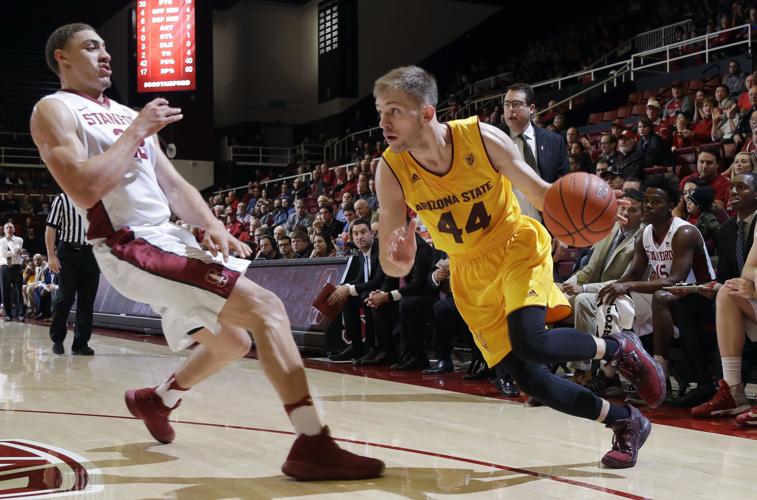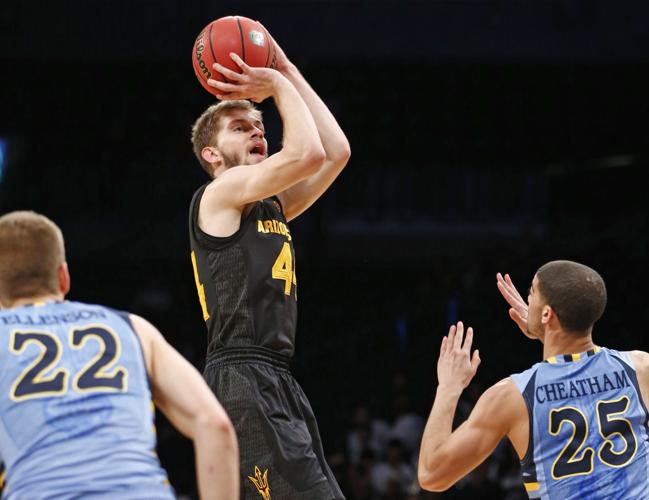If you listen real hard on Thursday night in McKale Center, there’s a good chance you’ll hear Kodi Justice barking orders at a freshman guard, directing a young forward into the post or pulling a frustrated teammate aside to offer a quick hype session.
It’s not all that long ago that such bold vocal leadership would’ve been unexpected out of Justice — surprising, shocking even.
Challenged with dyslexia as a young man, Justice found speaking in public difficult.
Now, months away from college graduation — he’ll be the first in his family to do so — and with a master’s degree, and potentially a doctorate on his mind, Justice is a case study in overcoming odds, in hard work and perseverance.
“As a kid it was, ‘How can I just be on the court and show this is who I am?’” he said. “But I want to say sophomore year in high school, I let myself show everyone who I am as a person. I learned to not worry about messing up, about being scared. I was like, ‘Here I am. If you don’t like it, I’ll find someone else who will.’”
That brashness has served him well at Arizona State, where he’s started for parts of three seasons — and for two different coaching staffs — with one goal.
To give basketball what it’s always given him.
“One thing he told me is when he plays basketball, everything else goes away,” teammate Shannon Evans II said. “He feels free. It becomes his sanctuary.”
Basketball has indeed “always been my outlet,” Justice said. And more, “It will always be.
“If there’s a tough time here or there, you’ll find me in a gym,” he said. “I’ll be up at 1 a.m., putting shots up.”
Justice, who was a skilled scorer out of Dobson High School in Mesa, has always looked to the court in times of stress. When he couldn’t communicate well, when school troubles got to him, he found a way to unwind, and as he said, “The basketball court is a tough place. It’s a do-or-die kind of game. If you don’t play well, you don’t play. But it’s also a forgiving sport. You can always go back out tomorrow.”
And he did, building a work ethic that has carried him into his 20s.
In Tempe, he has taken extra courses every summer in order to graduate early, so that he may get a head start on post-graduate work that is covered by his NCAA scholarship.
He’s returned for his junior season emboldened and louder, finding a kindred spirit in his head coach Bobby Hurley, himself a former college star guard known for his lip and his play. Like so many college basketball players, he has matured from a hopeful freshman who tries to make every play his own into a seasoned leader who finds more joy in facilitating for others.
“I’ve always been the guy people look to for help on the court,” he said. “It’s like having another coach on the court. That’s how I look at myself. Stepping in as a freshman, you think I have to score, I have to guard, I have to do these things by myself to get on the court to play. Sophomore year, maybe if I get this guy a bucket I get him going. This year, I’ve realized that taking that leadership role would be most important for this team.”
Along with returning leading scorer Tra Holder and Evans — who rejoined Hurley, his former coach at Buffalo — Justice has blossomed as a focal, and vocal, point.
“This is my first year playing with him, but I’ve seen him become a real big vocal leader,” Evans said, “and he does all the dirty work that don’t come up on a stat sheet.”
Added Justice: “We do it by committee, but being able to step into that role was needed. We have guys who can score, who can make plays, who can defend — but it’s the little things that change things when we’re down two with two minutes to go.”
This is something he’s learned over time, which is the best part about his story.
He learned it, and now, having become battle-tested in his lifelong bout with dyslexia, that’s something he actually cares about. He remembers a time when schooling was tantamount to torture, when a fourth-grade reading assignment was as daunting as Tolstoy’s “War and Peace.”
Now he craves knowledge, even the most trivial.
He and his father frequently challenge each other with college basketball trivia, which player played where, and when.
Someday, he’ll be the answer to one of those questions.
And it’ll only be because he worked himself there.
“Having dyslexia, that built it in me,” he said. “There were times I didn’t want to do it. It was hard. I decided to go in headstrong, and the outcome would be better. I kept pushing on, and before I knew it, I liked to learn. I took that off the court, and my work ethic pushed me in school, too.”





